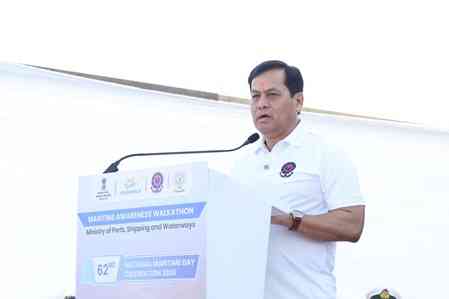India stands for rule-based maritime borders in Indo-Pacific region: Rajnath
Defence Minister Rajnath Singh on Saturday reaffirmed India's resolve for open, free and rule-based maritime borders in the Indo-Pacific region.

New Delhi, Oct 15 (IANS) Defence Minister Rajnath Singh on Saturday reaffirmed India's resolve for open, free and rule-based maritime borders in the Indo-Pacific region.
Singh underlined that India, throughout history, has been a peace loving society which has never invaded a foreign land and has always respected universal human values & territorial integrity of other countries, while treating them as equal partners.
While addressing the 18th Heads of Asian Coast Guard Agencies Meeting (HACGAM) here on Saturday, the Defence Minister stressed that oceanic space should be respected as a global common for the benefit of all humanity in an environmentally sustainable way.
"We stand for open, free, rule-based maritime borders in Indo-pacific, in which no nation, how-so-ever big, may be allowed to appropriate the global common or exclude others from its fair use. We are always ready and forthcoming to work with all the like-minded partner countries across various forums towards this endeavor," Rajnath Singh said.
The Defence Minister stressed that India's shared vision of 'SAGAR' (Security and Growth of All in Region), Sustainable Development Goals and 'Rule Based Order at Sea' complement the focused Indian approach of inclusive growth and lasting collaboration in the Indo-Pacific region.
He highlighted India's focus towards blue economy, and strongly advocated the sustainable use of ocean resources for economic growth, improved livelihoods and jobs and preserving the health of ocean ecosystem.
Rajnath Singh voiced India's commitment to implement international regulations; enact legislations for maritime safety and security; establish cooperative mechanism with nations and engage in capacity building of maritime law enforcement agencies.
He emphasised that India is also encouraged by the effectiveness of agreements like Regional Cooperation Agreement for Combating Piracy and Armed Robbery Against Ships in Asia and considers mutual cooperation alone as the most effective way for ensuring safety and security at sea. He called for sparing no efforts while promoting such cooperative mechanisms.
Calling for effective collaboration among maritime nations to deal with challenges to maritime safety, he said "With continued growth in marine traffic, the potential risk of marine pollution and requirement of Search and Rescue consequent to any unwanted maritime incidents have also grown manifolds."
The recent oil spill incidents have raised concerns about maritime environmental and the attendant life hazards. Illegal Unreported and Unregulated (IUU) fishing continues to threaten long term ocean sustainability. Smuggling, drug trafficking and human trafficking through ocean routes has made maritime law enforcement more challenging. Successful response strategy against threats is the need of the hour, he said.
Indian Coast Guard (ICG) is hosting 18th HACGAM in coordination with HACGAM secretariat from October 14-18, 2022. A total of 55 representatives from 18 countries and two International Organisations - Regional Cooperation Agreement on Combating Piracy and Armed Robbery against Ships in Asia Information Sharing Centre (ReCAAP ISC) & United Nations Office on Drugs & Crime- Global Maritime Crime Programme (UNODC-GMCP) - are participating in the meeting.
The HACGAM is a multilateral forum of 23 countries viz. Australia, Bahrain, Bangladesh, Brunei, Cambodia, China, France, India, Indonesia, Japan, South Korea, Lao PDR, Malaysia, Maldives, Myanmar, Pakistan, Philippines, Singapore, Sri Lanka, Thailand, Turkiye, Vietnam and one Region i.e. Hong Kong (China). Additionally, two international organisations viz. The 1st HACGAM was hosted by Japan Coast Guard in 2004 at Tokyo. This is the only forum where all the heads of Asian CG agencies congregate.


 IANS
IANS 








